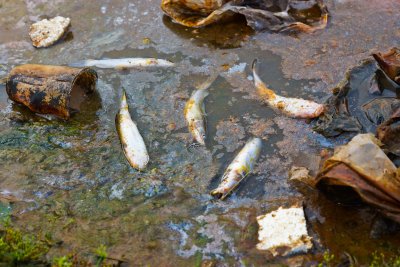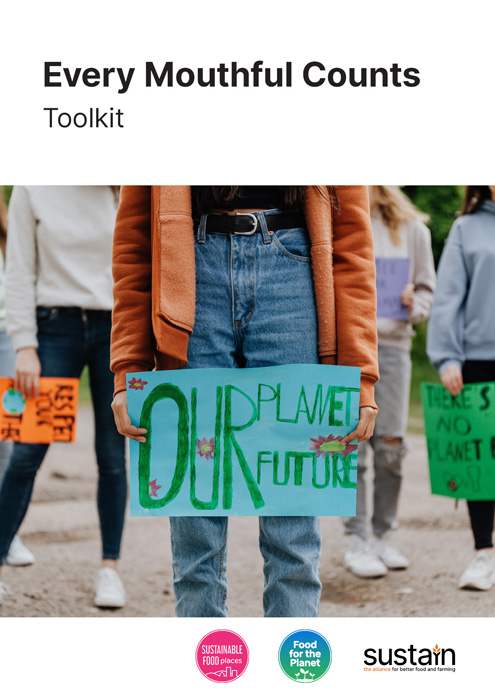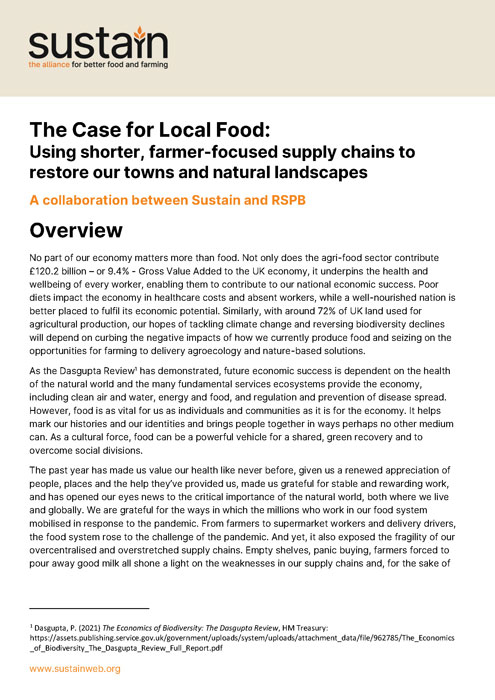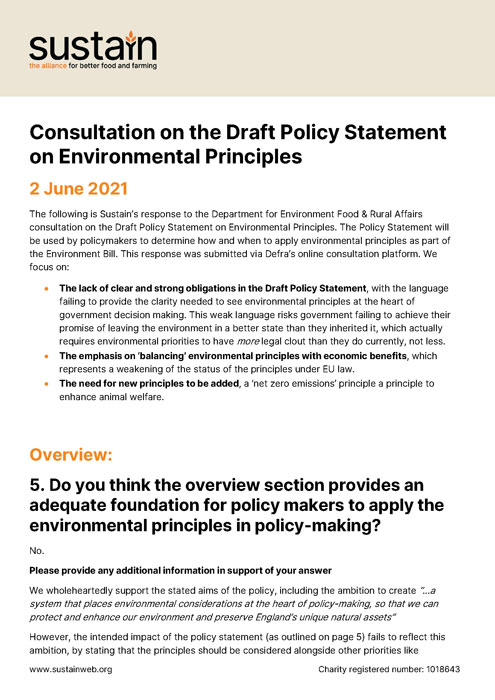Sustain • Climate Change and Nature
Good Food on the Public Plate
In 2010, the UK public sector spent over £2.4 billion on procuring food for schools, hospitals, prisons, government agencies, and care homes. There are many outstanding public sector caterers across the UK serving exceptional food to some of our most vulnerable citizens. However, good practice is not consistant, meaning public sector food is failing to make us healthier, benefit our farmers, or lead a transition to diets compatable with the government's net zero targets.
What's the problem?
- Non-compliance with so-called ‘legally binding’ Government Buying Standards appears to be widespread. Unfortunately, a clause in the buying standards allows them to be ignored where there is 'a significant increase in costs which cannot reasonably be compensated for by savings elsewhere'. Unsurprisingly, reports from Sustain, our members, and the Government suggest that compliance with the standards is around 50% (see Sustain's submission to the Environment, Food and Rural Affairs Committee: Public Sector Procurement of Food).
- The Government Buying Standards don't reflect a planet-friendly diet, and fail to support good UK farmers and producers and workers. Whilst the standards for some produce (fish, for example) are strong, overall they don't reflect the shift in public preferences and supply chains towards better food. The standards don't stipulate free-range eggs, for example, even though they are now the norm in retail. They are also not compatible with the changes needed to meet the UK net-zero targets (even though public sector food could lead innovation on this issue and normalise good diets).
- There is a lack of transparancy. The public can't scrutinise how our money is being spent because there is no formal, indepenent regime for monitoring compliance with standards, as there is for, say, hospital cleanliness and patient care standards.
What needs to happen?
With a few tweaks to policy, public sector food could deliver much better value for the taxpayer, and the following recommendations should be integrated into the independent National Food Strategy, and the government white paper due six months later.
1. Enshrine buying standards in law.
When standards are enshrined as a statutory obligation (like school food) compliance appears to be much better than when they aren’t (like hospitals). The standards must also be extended to cover the whole public sector, at the moment schools and local authority purchasing are only 'recommended' to comply.
Making standards mandatory is essential if public sector food is to genuinely fulfill its potential. Our evidence from the Sustainable Fish Cities campaign shows that suppliers and producers can adapt sucessfully to new standards to make compliant products accesible (and, in fact, the norm), but can only invest in product development if they have full confidence in the market for their produce, for the long term.
2. Improve the Government Buying Standards
A review of standards is needed, to bring them up to date with the new post-Brexit opportunities and make them strong enough to deliver on this government’s promises. All standards must be 'net zero emissions proofed’ and reflect the One Planet Plate. Broadly, these changes would mean:
- Serving less and better meat:
- Introduce a flexible meat allowance to limit meat served each week, with caterers in charge of how to do so. Scotland already have an allowance for red meat in schools. A 20% reduction on the same model was trialed successfully in April 2020 by PSC 100, the public sector caterers’ network. Reducing meat, eggs and dairy in our diets by 50% would cut UK greenhouse gas emissions associated with agriculture by 25-40% and require 23% less land for food production. It could also prevent over 30,000 deaths from cardiovascular disease and cancer, and save the NHS £0.85bn each year.
- Increase the proportion of meat bought from better-standard farmers in the UK. The impact of animal farming on our environment and human health differs greatly depending on where and how animals are raised, the feed they eat, and the antibiotics used and chemicals used on farms. 'Better' meat means demonstrably better than the UK minimum, including RSPCA Assured and LEAF Marque. The best choices are Organic, free range, and Pasture for Life
- Serve more fruit and vegetables, which would be a valuable boost to the UK horticulture sector
- Less heavily processed food, sugary drinks and heavily refined sugars. Sugar and palm oil associated with heavily processed food are major causes of habitat loss, normally oversees. Spending less on these products would help tackle climate change and allow more investment in food from UK producers
- 100% verifiably sustainable fish (as already stipulated in the Government Buying Standards)
- A target for increasing organic food and drink
- Targets and incentives to buy from small-scale and UK producers, which increase year on year, including buying Real Bread, including rolling out the Dynamic Procurement model across the UK. Every £1 spent on local food has been found to put £3 into the local economy.
- Remove the clause allowing the standards to be ignored if they lead to a 'significant increase in costs'.
3. Improve monitoring and enforcement
The benefits of good buying standards can only be achieved if they are effectively monitored, enforced, and compliance is transparent, and this could be achieved as follows:
- Independent organisations (for example official bodies such as Ofsted and NHS Improvement, or the Care Quality Comission) should be appointed to design an inspection regime. They should monitor and report on compliance with standards, take up of certified food (LEAF, organic, Fairtrade etc) and participation in key programmes such as Soil Association Food for Life. For schools, this could be a revision of the Healthy Schools Ratings Scheme.
- Transparency improved by publishing compliance data. Public sector organisations should know whether the company they intend to employ has a track-record of compliance with food standards. This will raise standards, ensure a level playing field, provide certainty for businesses and ensure better value for money for the taxpayer.
- Monitor and report on the social value delivered by public sector catering. According to the Public Services (Social Value) Act 2012, there is a statutory requirement for all public bodies to have regard to economic, social and environmental well-being in contracts. The outcomes of public procurement in relation to these social values should be regularly considered and used to inform improvement.
4. Expand the School Fruit and Vegetable Scheme
Currently this scheme covers infant-age children and 2.3 million pieces of fruit and vegetables are delivered to 16,600 schools in England for around 8p per child per day. Expanding the scheme to all primary children and other UK nations would be a remarkably good value for money way to level off inequalities in access to fresh fruit and vegetables among children. The latest evaluation shows that the scheme leads to an increase in fruit and veg consumption in younger children, and longer and integrated interventions would see this to continue in older children.
A very low proportion of produce used is grown in the UK - just 15% of apples and 5% of pears. This should be supporting British farmers and traders. The Scheme should specify a year-on-year increase of British, seasonal and certified sustainable produce, such as Organic or LEAF mark.
There is an appetite for improved standards and they have been proven to work at scale. The Soil Association’s Food For Life Served Here scheme is voluntary, and has been adopted by schools, universities, hospitals, workplaces and residential care setting serving over 1.8 million meals per day, including about 50% of English primary schools. Organisations covering 10,000 sites have joined the Sustainable Restaurant Association ‘Food Made Good’ assessment and rating scheme for sustainability. Sustain’s reports chart over 10 years of public sector organisations going above and beyond minimum standards in their locale. These schemes, and others including this case study from Cardiff and Vale University Health Board show that higher standards and better food can lead to higher profits, increased takeup and a viable food service.
5. Ensure smaller, sustainable producers can access public procurement contracts
We would like to see strong support fresh, local produce from sustainable SME producers into the UK public sector food and drink through strong investment in dynamic procurement models. This allows, via technology facilitated dynamic procurement, fulfilment and delivery, for an accesible market in public procurement for smaller scale, sustainable growers.
Dynamic Purchasing Systems (DPS) are not new in public sector - they're used across the EU in a range of non-food categories to enable Small to Medium Sized Enterprise (SME) access to public sector markets. But there are significant barriers to the public sector for SME primary food producers so this kind of system has been difficult to implement. We need to see government investment in rolling out DPS and ensuring procreres have the budget and training to use this system for food purchasing.
Further information
- Taking The Pulse of Hospital Food: A survey of NHS hospitals, using London as a test case
- Submission to the Environment, Food and Rural Affairs Committee: Public Sector Procurement of Food
- Blog: How a Flexible Meat Allowance could create climate-friendly meals by putting chefs in charge
Climate Change and Nature: Sustain has taken a keen interest in the rapidly accumulating evidence about the effect of food and farming on climate change and nature, as scientific evidence emerges that our food system is a very significant contributor to greenhouse gas emissions and biodiversity loss.






